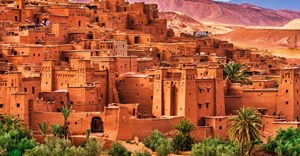Trending
Elections 2024
Jobs
- Show Producer Johannesburg
- Media Production Administrator Cape Town
- Scriptwriter Somerset East
- News Editor Johannesburg
- Mid-Level Sub-Editor Cape Town
- Music and Scheduling Lead Johannesburg
- Media Planner/Buyer Johannesburg
- Videography Intern Cape Town
- Online Managing Editor Johannesburg
- Mid-Level Journalist/Content Manager Assistant Johannesburg
Parliament removes hurdle for TVM, MBC merger
Presenting the bill before parliament on 4 June 2012, information minister Moses Kunkuyu said this was the piece of legislation that was part of the process of legal formalisation of MBC operations.
"The MBC Act is the law that established the public broadcaster and already provided for the operation of both a radio and television station," he said.
He said the bill sought to provide dissolution of TVM and to transfer any of its property, assets, funds, liabilities, obligations, agreements and other arrangements to MBC.
His predecessor, in the late president Bingu wa Mutharika government, Patricia Kaliati in her submissions to the debate over the bill, declared that TVM was existing illegally since its establishment in 1999.
"Since its establishment, it was operating as a public broadcaster despite being registered as a private company," she said.
Kunkuyu agreed with her saying TVM was incorporated as a private company under the Companies Act in 1999.
Former president Bakili Muluzi established TVM and ignored the provision in the MBC Act that it could also operate as a TV since it had been operating as a radio station since the 1950s. But Mutharika messed up the whole establishment when he merged a company with a parastatal that was created through the Act of parliament.
Opposition Malawi Congress Party (MCP) information spokesperson Jolly Kalelo hinted that it is a mockery that parliament was called to clean up the mess now.
"The bill has been brought posthumously considering that the merging process already started," he said.
He also said the change of status will now allow government to easily control resources at the public broadcaster.
In July 2010 government announced that MBC which was previously operating as Radio 1 and Radio 2 merged with TVM, the result of which led to illegal movement of members of staff who challenged the matter in court of law.
As a result of the merger, Mutharika appointed former acting director general of the defunct Malawi Television (TVM) Bright Malopa to become director general of the newly created institution which was now runs state controlled television services and two radio stations.
The merger of Malawi's two state owned broadcasters was facilitated by a task force comprising officials from the department of Public Reforms in the office of the president and cabinet and the two institutions are said to be working on the final modalities.
At one time after the merger, employees of the state broadcaster, went on strike to force management improve their working conditions and disparities in salaries between those working for the television section to those working for the radio section.
According to an October 2010 report by Media and Communications Committee of Parliament it was established that TVM started as a project where government killed what used to be Malawi's sole International Conference Centre and turned it into TVM studios.
Since the building was not a purpose built infrastructure for a television station it caught fire two years after it was established and in the process lost its state-of-art studio and until then it has been using a makeshift studio.
By 2010, TVM had only about 16 cameras, and two of which were meant for the function of His Excellency the state president of the Republic of Malawi, and while the rest of the camera are used by the station for other purpose.
Due to financial constraints TVM It learned that TVM was planning to introduce TV levies or licenses with the idea of boosting its revenue in order to improve its operation, but there was no law to back such an initiative since it was a company registered in the name of politicians who were ruling at that time.
Since the two institutions were operating from the commercial city of Blantyre and had different boards, management and operated from different premises as entirely independent institutions with the dissolution of TVM they will now legally operate as a single entity.
Parliament says MBC management has now to come up with plans of raising more revenue, considering that their allocation from government budget is always inadequate.














